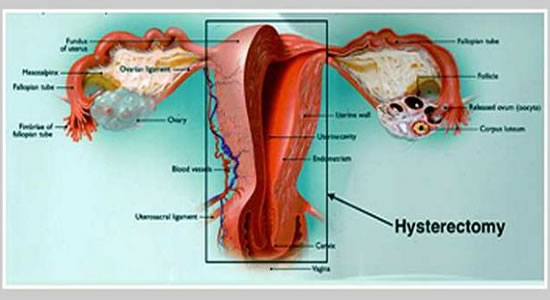Women who undergo a hysterectomy are at greater risk for heart disease and other health issues -- even if they keep their ovaries, new research suggests.
"Hysterectomy is the second most common gynecologic surgery, and most are done for benign reasons because most physicians believe that this surgery has minimal long-term risks," said lead researcher Dr. Shannon Laughlin-Tommaso, of the Mayo Clinic in Rochester, Minn.
"With the results of this study, we encourage people to consider nonsurgical alternative therapies for fibroids, endometriosis and prolapse, which are leading causes of hysterectomy," she said.
The study tracked the health of nearly 2,100 women who underwent a hysterectomy, and a matched set of "controls" who hadn't undergone the procedure. The hysterectomies were performed between 1980 and 2002, and in all cases the ovaries were not removed.
Because it was retrospective in nature, the study could only point to associations; it could not prove cause-and-effect.
However, the Mayo team reported that -- compared to women who hadn't had a hysterectomy -- women who had the procedure experienced an average 14 percent higher risk of abnormal blood fat levels; a 13 percent higher risk for high blood pressure; an 18 percent higher risk for obesity and a 33 percent greater risk for heart disease.
Long-term health issues associated with hysterectomy were especially pronounced for younger women. The study found that women younger than 35 had a 4.6-fold higher risk of congestive heart failure and a 2.5-fold greater risk of coronary artery disease, or a buildup of plaque in the arteries.
"This is the best data to date that shows women undergoing hysterectomy have a risk of long-term disease -- even when both ovaries are conserved," Laughlin-Tommaso said in a Mayo news release. "While women are increasingly aware that removing their ovaries poses health risks, this study suggests hysterectomy alone has risks, especially for women who undergo hysterectomy prior to age 35."
A gynecologist who reviewed the findings stressed that for many women, there are alternatives to hysterectomy.
Some of the most common reasons women have for hysterectomy are bleeding and fibroids," said Dr. Jennifer Wu, an obstetrician-gynecologist at Lenox Hill Hospital in New York City.
She said that, "with many more treatment options such as endometrial ablation and uterine fibroids embolization, hysterectomy is becoming a last resort treatment for premenopausal women."
But another gynecologist said it may be too early for women to forego hysterectomy if it's deemed necessary.
Dr. Adi Davidov directs gynecology at Staten Island University Hospital in New York City. He stressed that the Mayo study was only using retrospective data, so it couldn't prove that factors other than hysterectomy were causing the women's health issues.
(culled from webmd)



















